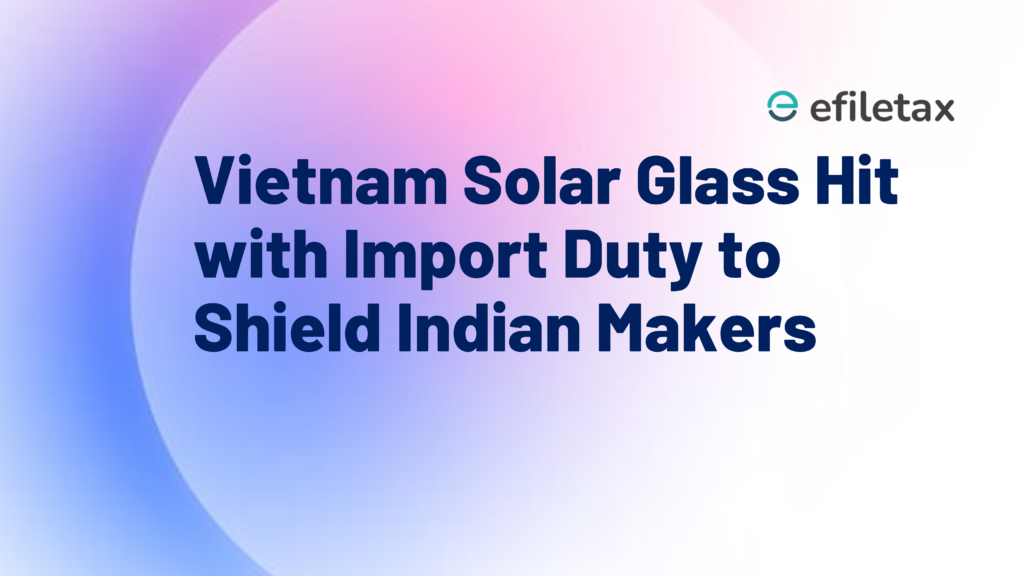
Introduction:
Countervailing duty on Vietnamese tempered glass has been officially imposed by the Indian government to shield domestic solar manufacturers from unfair subsidies offered by Vietnam. The move follows an investigation by the Directorate General of Trade Remedies (DGTR) and aligns with India’s trade defense policy.
What is Countervailing Duty (CVD)?
- CVD is a trade remedy measure under the Customs Tariff Act, 1975.
- Imposed when a foreign country subsidizes its exports, creating unfair price competition.
- Helps level the playing field for Indian industries.
Background: Why Vietnamese Glass Was Targeted
- The product in focus: Textured tempered glass (solar glass) used in photovoltaic modules and solar thermal systems.
- Vietnam was found providing direct or indirect subsidies to exporters of solar glass.
- Indian manufacturers reported price undercutting, injury to their market share, and financial stress.
Legal Basis for the CVD Imposition
- Authority: Directorate General of Trade Remedies (DGTR), Ministry of Commerce & Industry.
- Law Invoked: Section 9 of the Customs Tariff Act, 1975 read with the Customs Tariff (Identification, Assessment and Collection of Countervailing Duty on Subsidized Articles and for Determination of Injury) Rules, 1995.
- Notification expected soon via Ministry of Finance under the Customs Department.
Impact on Key Stakeholders
✅ Indian Solar Glass Manufacturers
- Gain fairer market conditions.
- Can improve production capacity and pricing competitiveness.
❌ Importers & EPC Contractors
- Higher cost of solar panel imports if reliant on Vietnamese glass.
- May need to explore alternate sourcing or shift to Indian suppliers.
CVD Rate and Duration
- The exact CVD percentage and tenure will be notified by the Department of Revenue, Ministry of Finance.
- Based on DGTR’s final recommendation, the duty may remain in force for up to 5 years, subject to review.
Trade Policy Context
- India’s recent push for Atmanirbhar Bharat (self-reliance) in renewable energy.
- Multiple CVD and anti-dumping duties in force to boost domestic manufacturing in steel, solar, and electronics sectors.
- Aligns with India’s WTO commitments under the Agreement on Subsidies and Countervailing Measures (SCM Agreement).
Expert Tip: Watch for Cost-Pass Through in Solar Tenders
“For EPC contractors and solar developers bidding in new projects, this CVD may increase material cost by 2–4%. Factor this into LCOE calculations.”
— Sanjay Mehta, Trade Analyst, Solar Council of India
FAQs
Q1. When will the CVD come into force?
A. Once notified by the Ministry of Finance; typically within 90 days of DGTR’s final recommendation.
Q2. Is it applicable only to Vietnam?
A. Yes, this order is specific to imports from Vietnam. Other countries may be separately reviewed.
Q3. Will this affect solar panel prices in India?
A. Yes, potentially. Cost of components like glass may go up for importers, unless they shift to domestic sources.
Summary
India imposes countervailing duty on solar glass imports from Vietnam to protect domestic manufacturers from unfair subsidies. This move may raise import costs and boost local production capacity.
Conclusion: What It Means for You
Whether you’re a solar EPC contractor, importer, or a policy follower — this countervailing duty on Vietnamese tempered glass marks another shift in India’s trade defense approach. It supports local industry while signaling tougher scrutiny of subsidized imports.